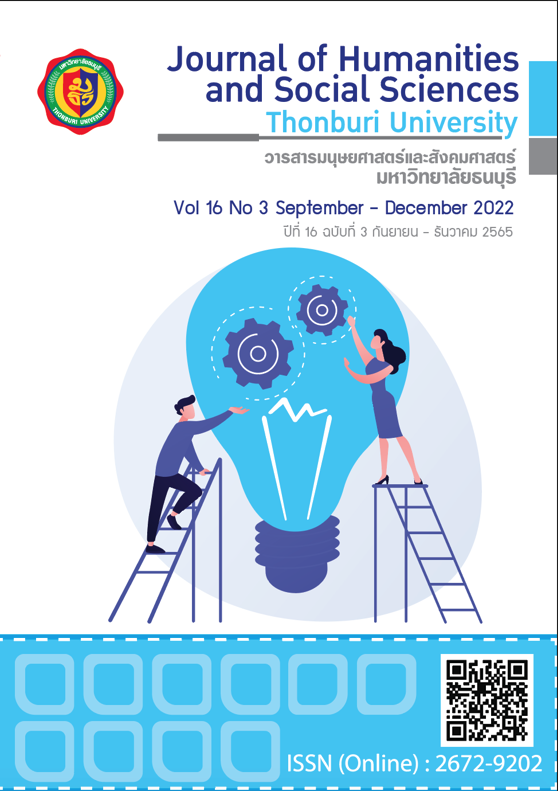ความฉลาดในการจัดการ และการสื่อสารในการทำงาน ที่สัมพันธ์กับความสามารถในการคาดการณ์ของพนักงาน
Main Article Content
บทคัดย่อ
การวิจัยครั้งนี้มีวัตถุประสงค์เพื่อเปรียบเทียบความสามารถในการคาดการณ์ของพนักงาน เมื่อจำแนกตามตัวแปรภูมิหลัง และเพื่อทำนายความสามารถในการคาดการณ์ของพนักงาน โดยใช้ความฉลาดในการจัดการและการสื่อสารในการทำงานในภาพรวม และเมื่อจำแนกตามตัวแปรภูมิหลัง กลุ่มตัวอย่างเป็นพนักงานในองค์การภาครัฐ เอกชน และรัฐวิสาหกิจ จำนวน 421 คน สุ่มแบบชั้นภูมิตามหน่วยงานที่สังกัด และเพศ สถิติที่ใช้ทดสอบสมมติฐานการวิจัย ได้แก่ การเปรียบเทียบค่าเฉลี่ย การวิเคราะห์ความแปรปรวนทางเดียว การวิเคราะห์ค่าสัมประสิทธิ์สหสัมพันธ์ และการวิเคราะห์ถดถอยพหุคูณ ผลการวิจัยพบว่า (1) พนักงานที่มีคู่มีความสามารถในการคาดการณ์สูงกว่าพนักงานที่ไม่มีคู่ มีนัยสำคัญทางสถิติที่ระดับ .05 (2) พนักงานที่มีประสบการณ์ทำงานมากกว่า 10 ปี มีความสามารถในการคาดการณ์สูงกว่าพนักงานที่มีประสบการณ์ทำงาน 10 ปี หรือน้อยกว่า อย่างมีนัยสำคัญทางสถิติที่ระดับ .05 (3) พนักงานที่มีอายุอยู่ในช่วง Baby boomer มีความสามารถในการคาดการณ์สูงกว่าพนักงาน Generation Y และ Generation Z อย่างมีนัยสำคัญทางสถิติที่ระดับ .01 และ 0.05 และ (4) คุณธรรมในการทำงาน ความฉลาดทางการบริหารจัดการอารมณ์ ความสามารถในการเรียนรู้และปรับตัว การประสานความร่วมมือในการทำงาน และการสื่อสารในการทำงาน สามารถร่วมกันทำนายความสามารถในการคาดการณ์ของพนักงานได้ร้อยละ 44.7
Article Details

This work is licensed under a Creative Commons Attribution-NonCommercial-NoDerivatives 4.0 International License.
ผลงานที่ปรากฎในวารสารฉบับนี้เป็นลิขสิทธิ์เฉพาะส่วนบุคคลของผู้เขียนซึ่งต้องรับผิดชอบต่อผลทาง กฎหมายที่อาจเกิดขึ้นได้และไม่มีผลต่อกองบรรณาธิการReferences
ฉัฐวีณ์ สิทธิ์ศิรอรรถ. (2553). ปัจจัยเชิงเหตุและผลของการเรียนรู้ด้วยการนำตนเองของนิสิต มหาวิทยาลัยศรีนครินทรวิโรฒ. วารสารพฤติกรรมศาสตร์. 16 (2), 66-82.
ธิดารัตน์ พราหมณ์มณี, ฉัฐวีณ์ สิทธิ์ศิรอรรถ, ดวงเดือน พันธุมนาวิน และสุพัทธ แสนแจ่มใส. (2565). ปัจจัยจิตสังคมที่สัมพันธ์กับพฤติกรรมการใช้ไฟฟ้าอย่างปลอดภัยของวัยผู้ใหญ่ในสถานประกอบการ. วารสารมนุษยศาสตร์ปริทรรศน์. 44(1): 1-17.
บุญใจ ศรีสถิตย์นรากูล. (2553). ขนาดอิทธิพล การวิเคราะห์อำนาจ การคำนวณขนาดตัวอย่างที่เหมาะสมโดยใช้โปรแกรม G*Power. กรุงเทพฯ: สำนักพิมพ์จุฬาฯ.
พนม เกตุมาน. (2563). จิตวิทยาเชิงบวกในครอบครัว. จาก https://drpanom.wordpress.com
วิชัย วงษ์ใหญ่; และ มารุต พัฒนผล. (2562). ทักษะคาดการณ์อนาคต. กรุงเทพฯ: มหาวิทยาลัยศรีนครินทรวิโรฒ.
Appelbaum, S., Bartolomucci, N., Beaumier, E., Boulanger, J., Carrigan, R., et al. (2004). Organizational Citizenship Behavior:Case Study of Culture, Leadership & Trust. Management Decision,42,13-40.
Arab, M., Zeraati, H., Shabaninejed, H., Lavasani, M., Akbari Sari, A. & Varmaghani, M. (2011). Study of Managers Emotional Intelligence and Its Relation with Their Performance in Selected Public and Private Hospitals in Tehran. Hospital Journal, 2, 1-7.
Bandura, A. (2002). Social Cognitive Theory in Cultural Context. Applied Psychology, 51(2), 269-290.
Beal, S. J. (2011). "The Development of Future Orientation: Underpinnings and Related Constructs" Theses, Dissertations, and Student Research: Department of Psychology. Retrieved February 18, 2022, from https://digitalcommons.unl.edu/psychdiss/32
Berkhout, F. & Hertin, J. (2002). “Foresight futures scenarios: Developing and applying a participative strategic planning tool.” Greener Management International, (March 2002) : 37-52.
Bigdeli, Z. (2014). Assessing the Relationship between Cultural Quotient with Job Performance among the Headquarters Managers of Tehran University of Medical Sciences. MSc. Dissertation in Health Care Management, Tehran University of Medical Sciences, Tehran.
Buchner, A., Faul, F., Erdfelder, E., & Buchner, A. (2007). G*Power 3: A flexible statistical power analysis program for the social, behavioral, and biomedical sciences. Behavior Research Methods. 39(2): 175-191. Retrieved from https://link.springer.com/content/pdf/10.3758/BF03193146.pdf
Costa & Kallick. (2004). Assessment Strategies for Self-Directed Learning. Thousand Oaks,California: Corwin.
Deci, E.L., Koestner, R. & Ryan, R.M. (1999). “A Meta-Analysis Review of Experiments Examining the Effects of Extrinsic Rewards on Intrinsic Motivation”, Psychological Bulletin. 125(6): 627-668.
DeVito, J.A.(2013). The Interpersonal Communication Book. 13thed. New Jersey: Pearson Education, Inc.
Ghasemi, S. (2012) The Survey of Emotional Intelligence Effect on Central Headquarters Managers of Tehran University of Medical Sciences. MSc. Dissertation in Management, Islamic Azad University, Tehran Central Branch, Tehran. (In Persian)
Gisela, T. (1983). Future Orientation and Socialization. International Journal of Psychology, 18, (1/4): 381-406.
Gjesme, T. (1983). On the Concept of Future Time Orientation: Considerations of some Functions' and Measurements' Implications. International Journal of Psychology, 18(1-4): 443-461.
Goleman, D. (1998). Working with emotional intelligence. New York: Bantam.
Hattie, J. & Timperley, H. (2007). The Power of Feedback. Review of Educational Research. 77(1): 81-112.
Hossein, D., Hojjat, R., Zeinab, B., Javadi Ghaleh Esmaeil, J.G., & Negar, Y., (2016). Managerial Quotient: A Systematic Review among Managers of Tehran University of Medical Sciences. American Journal of Industrial and Business Management. 6: 467-479.
Javadi, G. E. (2014). Study of Relationship between Spiritual Quotient, Moral Intelligence with Creativity among the Managers of Tehran University of Medical Sciences Schools. MSc. Dissertation in Health Care Management, Tehran University of Medical Sciences, Tehran.
Lencioni, P. (2010). The five dysfunctions of a team: A leadership fable. San Francisco: Jossey-Bass.
Mayer, J. D., et al. (2016). The Ability Model of Emotional Intelligence: Principles and Updates. Emotion Review, 8(4): 290-300. doi:10.1177/1754073916639667
Raynor, J. O. (2013). Future orientation and achievement motivation: Toward a theory of personality functioning and change. In Cognition in human motivation and learning (pp. 213-246).
Roy & Andrews, (1999). The Roy’s Adaptation Mode., Stamford: Appleton & Lange.
Schiemann, W.A. (2017). “Winning the HRM Evidence-Based Impact Award-Lessons Learned: A conversation With Key Stakeholders to the Process” Industrial and Organizational Psychology. 10(2): 314-326.
Seligman, M. (1998). Learned Optimism. New York: Simon & Schuster Inc.
Yousefzadeh, N. (2012). The Survey of Relationship between Spiritual Quotient with Transformational Leadership Style among Senior Managers of Tehran University of Medical Sciences. MSc. Dissertation in Health Care Management, Tehran University of Medical Sciences, Tehran.
Translated Thai References
Getman, P. (2020). Positive Psychology in Family. from https://drpanom.wordpress.com (in Thai)
Prammanee, T., et al. (2020). Psychological Factors Related to Electric Safety Behavior of Adults in The Workplace. Manutsat Paritat – SWU, 44(1): 1-17. (in Thai)
Sitsira-att., Shuttawwee (2020). AQ and EQ Related to Lifelong Learning of Undergraduate Students. ABAC ODI Journal Vision. Action.Outcome. 7(1): 145-154.
Srisatidnarakul, B. (2020). Effect Size, Power Analysis, Optimal Sample Size Calculations Using G*Power Software. Bangkok: Chulalongkorn University Press. (in Thai)
Sitsira-att., Shuttawwee (2010). Antecedent and Consequence Factors of Self-Directed Leaning of Undergraduate Student at Srinakarinwirot University. Behavioral Science Research Institute.16(2): 66-82. (in Thai)
Wongyai, W., & Patanapul, M. (2019). Foresight the Future. Bangkok: Srinakharinwirot University. (in Thai)

